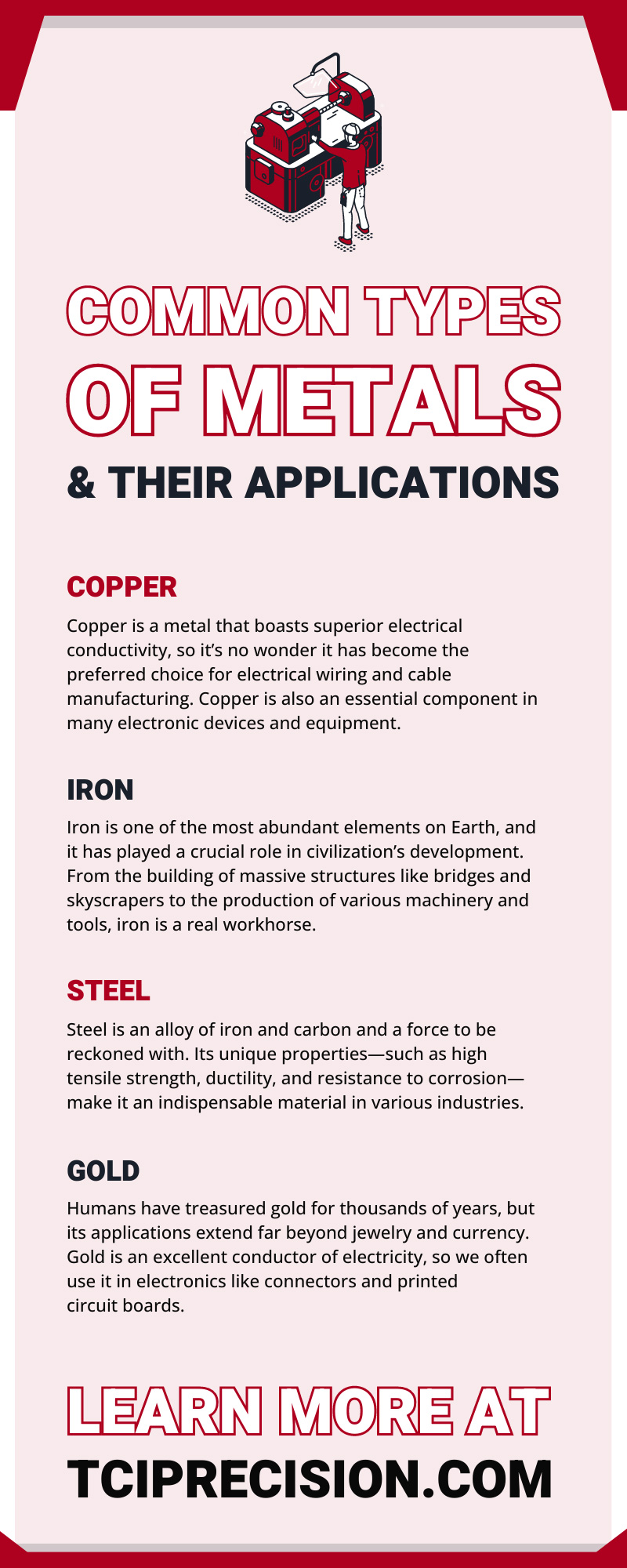Common Types of Metals & Their Applications
Metals form the backbone of modern society and play essential roles in various industries. If you’re curious to learn more about how we use metals in the world around you every day, you’ve come to the right place. Read on to learn some of the most common types of metals and their applications.
Copper
Copper is a metal that boasts superior electrical conductivity, so it’s no wonder it has become the preferred choice for electrical wiring and cable manufacturing. Copper is also an essential component in many electronic devices and equipment.
But that’s not all—this metal has antimicrobial properties, making it a popular choice for doorknobs, handrails, and other high-touch surfaces. Additionally, plumbing and roofing applications have made use of copper for centuries, proving that its versatility goes beyond its conductive prowess.
Iron
Iron is one of the most abundant elements on Earth, and it has played a crucial role in civilization’s development. From the building of massive structures like bridges and skyscrapers to the production of various machinery and tools, iron is a real workhorse.
Its popularity is due to its high tensile strength and relatively low cost. With the advent of steel (an alloy of iron and carbon), the importance of iron in modern society has only grown.
Steel
As we mentioned, steel is an alloy of iron and carbon and a force to be reckoned with. Its unique properties—such as high tensile strength, ductility, and resistance to corrosion—make it an indispensable material in various industries.
From automotive manufacturing to household appliances and cutlery production, steel has truly become a staple in modern life. Thanks to its recyclable nature, steel is also a more environmentally friendly option for many applications.
Gold
Humans have treasured gold for thousands of years, but its applications extend far beyond jewelry and currency. Gold is an excellent conductor of electricity, so we often use it in electronics like connectors and printed circuit boards.
Dentistry also uses gold, owing to its biocompatibility and malleability. Moreover, gold’s reflective properties make it a valuable component in satellite and space exploration technologies.
Silver
Silver is another precious metal with a myriad of applications. Like gold, silver is an excellent conductor of electricity, so electrical contacts and conductors use it. Its antimicrobial properties have led to its use in medical equipment and wound dressings. Additionally, silver’s lustrous appearance and malleability make it a popular choice for jewelry, tableware, and decorative items.
Platinum
Platinum is a rare, precious metal that possesses numerous unique properties. Its high melting point and resistance to corrosion make it ideal for high-temperature applications and harsh environments. The automotive and chemical industries widely use platinum as a catalyst, as it plays a crucial role in reducing harmful emissions and speeding up chemical reactions. Additionally, its rarity and durability make it a sought-after material for high-end jewelry and watches.
Titanium
Titanium is a metal known for its exceptional strength, low density, and corrosion resistance. It has an unmatched strength-to-weight ratio, making it a popular choice for aerospace, automotive, and military applications. In the medical field, titanium’s biocompatibility is perfect for implants, such as artificial joints and dental implants. On top of that, its resistance to corrosion makes it an attractive option for outdoor and marine applications.
Nickel
Nickel is a versatile metal that excels in resisting corrosion, making it a valuable component in various alloys. One of its most well-known applications is in the production of stainless steel, as it significantly enhances the steel’s corrosion resistance.
Additionally, rechargeable batteries use nickel, making it a vital component for the rapidly growing electric vehicle and renewable energy industries. Its magnetic properties also make it useful in electronics and computer hardware.
Zinc
Zinc may not be the flashiest metal on this list, but it plays an essential role in protecting other metals from corrosion. One of its most significant applications is in the process of galvanization, where manufacturers apply a thin layer of zinc to steel or iron to prevent rusting.
Zinc is also a vital component in various alloys, such as brass (a copper-zinc alloy) and die casting alloys. In addition, zinc’s biocompatibility and nontoxic nature make it a popular choice for nutritional supplements and pharmaceutical products.
Lead
Lead is a dense, soft, and malleable metal that humans have used for thousands of years. Its high density makes it an excellent material for radiation shielding, such as in X-ray machines and nuclear reactors.
Lead is also useful in the production of batteries, particularly lead-acid batteries for vehicles. However, due to concerns about its toxicity, lead’s role in plumbing and household products has greatly reduced, with safer alternatives taking its place.
Aluminum
Aluminum is a lightweight and versatile metal that the transportation, aerospace, and construction industries widely use. Thanks to its high strength-to-weight ratio, it’s the go-to metal for constructing airplanes, cars, and even bicycles.
Aluminum is also a popular choice for packaging, such as cans and foil, due to its excellent corrosion resistance and ease of recycling. Its nontoxic nature also makes it suitable for kitchen utensils and appliances. Truly, aluminum is a jack-of-all-trades in the world of metals—if you need custom aluminum plates, TCI Precision Metals has you covered.
Tungsten
Tungsten is a metal that boasts an extremely high melting point, making it perfect for high-temperature applications. Filaments for incandescent light bulbs and heating elements for electric furnaces are two common uses of this metal.
Tungsten’s hardness also makes it a popular choice for cutting tools, such as drill bits and milling cutters. In addition, the metal’s density and strength lend themselves well to applications in the aerospace and military industries, where durability and heat resistance are of utmost importance.
Magnesium
Magnesium is a lightweight metal with a variety of applications, particularly in the automotive and aerospace industries. Its low density and high strength-to-weight ratio make it an attractive option for reducing the weight of vehicles and aircraft, leading to improved fuel efficiency and performance.
Magnesium also plays a role in the production of alloys, combining with other metals to enhance their properties. Furthermore, its biocompatibility allows for its use in medical applications, such as bone implants and surgical instruments.
Now that you know these common types of metal and their applications, we hope you have a greater appreciation for how much the world runs on these materials.


